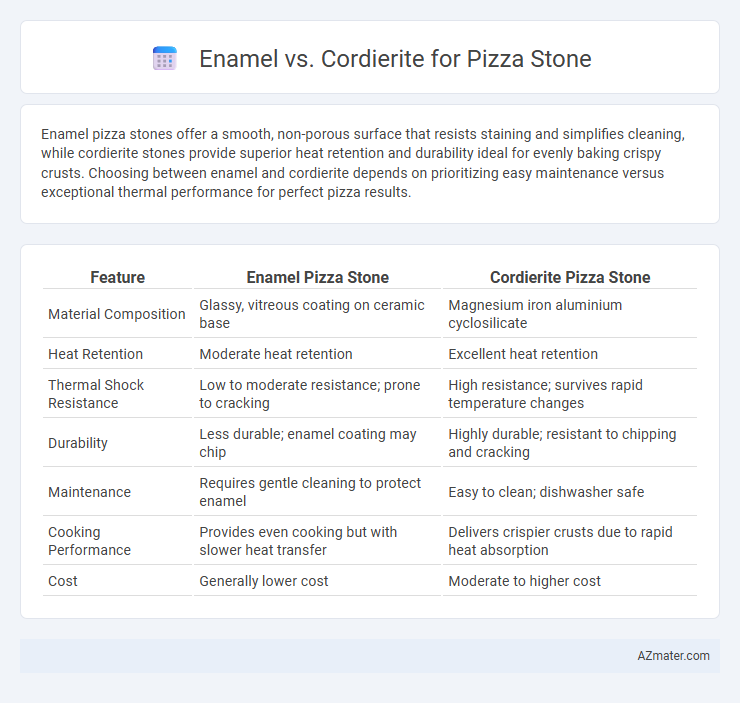Enamel pizza stones offer a smooth, non-porous surface that resists staining and simplifies cleaning, while cordierite stones provide superior heat retention and durability ideal for evenly baking crispy crusts. Choosing between enamel and cordierite depends on prioritizing easy maintenance versus exceptional thermal performance for perfect pizza results.
Table of Comparison
| Feature | Enamel Pizza Stone | Cordierite Pizza Stone |
|---|---|---|
| Material Composition | Glassy, vitreous coating on ceramic base | Magnesium iron aluminium cyclosilicate |
| Heat Retention | Moderate heat retention | Excellent heat retention |
| Thermal Shock Resistance | Low to moderate resistance; prone to cracking | High resistance; survives rapid temperature changes |
| Durability | Less durable; enamel coating may chip | Highly durable; resistant to chipping and cracking |
| Maintenance | Requires gentle cleaning to protect enamel | Easy to clean; dishwasher safe |
| Cooking Performance | Provides even cooking but with slower heat transfer | Delivers crispier crusts due to rapid heat absorption |
| Cost | Generally lower cost | Moderate to higher cost |
Introduction to Pizza Stones: Enamel vs Cordierite
Pizza stones made from cordierite offer exceptional thermal shock resistance and even heat distribution, making them ideal for achieving crispy, evenly baked crusts. Enamel-coated pizza stones provide a non-porous, easy-to-clean surface that resists staining and moisture absorption, ensuring durability and maintenance convenience. Choosing between enamel and cordierite depends on priorities like heat retention, cleaning ease, and long-term performance in pizza baking.
Material Composition: Enamel and Cordierite Compared
Enamel pizza stones are made by coating a metal or ceramic core with a layer of vitreous enamel, providing a smooth, non-porous surface that resists sticking and is easy to clean. Cordierite, a naturally occurring mineral composed primarily of magnesium, aluminum, and silicon oxides, is prized for its exceptional thermal shock resistance and durability, making it ideal for high-temperature baking. Cordierite's porous structure absorbs and evenly distributes heat, while enamel offers a less absorbent surface that may influence moisture retention during pizza baking.
Heat Retention and Distribution Properties
Enamel pizza stones typically offer moderate heat retention with a smooth surface that distributes heat evenly but may cool faster than other materials. Cordierite stones excel in heat retention due to their dense structure, providing consistent and long-lasting high temperatures ideal for baking crisp, evenly cooked pizza crusts. The superior thermal shock resistance of cordierite also prevents cracking, ensuring durability and reliable heat distribution during repeated use.
Durability and Longevity of Each Material
Enamel pizza stones offer moderate durability but are prone to chipping and cracking under rapid temperature changes or heavy impact. Cordierite stones are renowned for exceptional thermal shock resistance and long-lasting durability, making them less likely to break or warp over time. Cordierite's ability to withstand high temperatures and repeated heating cycles ensures superior longevity compared to enamel-coated stones.
Performance: Baking Results and Pizza Crust Quality
Enamel pizza stones offer rapid heat distribution and a smooth surface that prevents dough sticking, producing evenly baked crusts with a crisp outer layer and soft interior. Cordierite stones excel in heat retention and resistance to thermal shock, delivering a consistent bake with a slightly chewier crust texture favored for traditional Neapolitan-style pizzas. Performance-wise, enamel suits quick, high-temperature baking with easy cleanup, while cordierite provides durability and superior heat stability for prolonged baking sessions.
Ease of Cleaning and Maintenance
Enamel pizza stones feature a smooth, non-porous surface that resists sticking and simplifies cleaning by preventing food absorption and bacteria buildup. Cordierite stones, known for their porous nature, require more careful maintenance to avoid retaining oils and crumbs, which can lead to odors and stains over time. Enamel's durability against moisture and stains makes it a low-maintenance option compared to the more delicate cleaning routine needed for cordierite stones.
Resistance to Thermal Shock and Cracking
Enamel pizza stones offer a smooth, non-porous surface that resists staining but typically have lower resistance to thermal shock, making them more prone to cracking under rapid temperature changes. Cordierite stones excel in thermal shock resistance due to their high durability and ability to withstand sudden temperature fluctuations, reducing the risk of cracking during preheating or cooking. This makes cordierite the preferred choice for consistent, long-lasting performance in pizza baking environments demanding frequent temperature variation.
Price Comparison: Enamel vs Cordierite
Enamel pizza stones generally come at a higher price point due to their aesthetic finish and non-porous surface, offering easier cleaning and rust resistance. Cordierite stones are more affordable, valued for their superior heat retention and durability despite a more porous surface that requires seasoning. Budget-conscious buyers often prefer cordierite for performance and cost-efficiency, whereas enamel suits those prioritizing style and low maintenance.
Best Uses: Home Ovens vs Outdoor Grills
Enamel pizza stones are ideal for home ovens due to their smooth, non-porous surface which resists stains and easy cleaning, perfect for frequent indoor use. Cordierite pizza stones excel in outdoor grills by withstanding rapid temperature changes and high heat retention, making them durable for wood-fired or charcoal cooking. Choosing enamel for consistent indoor baking and cordierite for rugged outdoor grilling optimizes pizza stone performance based on cooking environment.
Which Pizza Stone Material is Right for You?
Enamel pizza stones offer a smooth, non-porous surface that resists stains and requires less maintenance, making them ideal for home cooks seeking easy cleanup. Cordierite stones excel in heat retention and thermal shock resistance, providing consistent baking performance and durability preferred by serious pizza enthusiasts and frequent bakers. Choosing between enamel and cordierite depends on your cooking frequency, maintenance preference, and desire for precision in heat distribution.

Infographic: Enamel vs Cordierite for Pizza Stone
 azmater.com
azmater.com